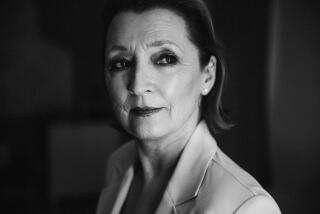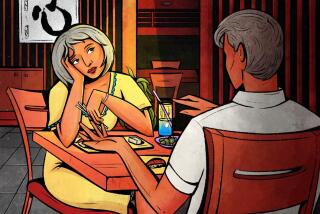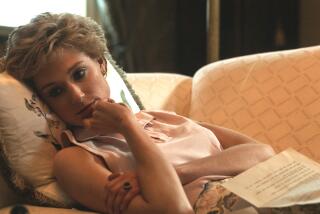The Bottom of the Royal Barrel : THE PRINCE OF WALES: A Biography, <i> By Jonathan Dimbleby (William Morrow & Co.: $24; 640 pp.)</i> : DIANA: Her New Life, <i> By Andrew Morton (Simon & Schuster: $23; 176 pp.)</i> : PRINCESS IN LOVE, <i> By Anna Pasternak (Dutton: $17.95; 192 pp.)</i>
This may not be the bottom of the barrel, as the saying goes, but you can certainly reach out and touch it from here. I have never been able to resist a book with a royal title in its title, but after reading the latest crop of books about the equally vapid, egocentric and whiny Prince and Princess of Wales I wanted to rinse my brain out with soap. The Prince and Princess seemed to have summoned all the Knights of the Word Processor in the Kingdom and held a tournament to see who could write the dullest, least informative, most unflattering book.
The winner, if only by virtue of pomposity and length, is Jonathan Dimblebyâs tirelessly fawning biography, âThe Prince of Wales.â In the preface the author states, âI have experienced a wide range of emotions in writing this book; boredom has never been one of them,â but the reader will beg to differ. Dimbleby was given full access to the Prince, as well as his friends, diaries, archives and letters, so he can hardly be expected to be hard-eyed and independent, even so, nothing prepares the reader for toadying quite like this.
Take this quote, from the Princeâs uncle and âhonorary grandfather,â Earl Mountbatten, referring to the Princeâs naval journal: âIn sixty yearsâ experience of Junior Officersâ Journals I cannot remember reading any whose accounts were so vivid, humorous and penetrating.â
Dimbleby was also responsible for the ITV television documentary, âCharles: The Private Man, The Public Role,â in which the Prince publicly confessed that he had committed adultery, and he depicts the heir to the throne as a piteous victim of fate: ignored by his mother, the Queen, bullied by his father, Prince Philip, abused by his schoolmates, and tortured by his publicity-mad, hysterical wife, Diana, whom he never loved and only married because his father put pressure on him to make a decision. Self-pity from a person whose birth was heralded with bell-ringing and 21-gun salutes, who receives an income of 4 million pounds a year from the Duchy of Cornwall, and whose job perks include luxurious trips around the world and a vast array of servants is bad enough.
Yet the Prince, who epitomizes the expression âhe was born on third and thinks he hit a triple,â is alternatively depressed or churlish. In response to a request to attend a celebrity golf tournament to benefit on of his pet charities, he noted: âI am sorry, but I only agreed to donate this idiotic trophy on the clear understanding that I would not have to present it or go anywhere near a golf match.â After a dinner at the Reagan White House, the Prince wrote in his journal: âTravolta asked Diana to dance. He whisked her on the floor and everyone left them on their own. . . . Sadly there were no lovely actresses or singers. I had been rather hoping that Diana Ross would be there.â
Dimbleby over-seasons the soup with the Princeâs forgettable opinions on architecture, spirituality and fund-raising, which nobody really cares about anyway, and skimps on the spicy details. (Frankly, Charles without Diana is about as riveting as Torvill without Dean.) The author has been the Princeâs guest at all the major palaces, yet he canât even convey much sense of place, beyond quoting another Sandringham guest as saying you get the creme de la creme of wild birds to shoot. And he seems so eager to be invited back for dinner that he fails to connect the most obvious dots.
For instance, we learn that Charles always loved Camilla Parker Bowles and was intimate with her up until his wedding and that he was jealous of his own wifeâs astounding popularity. Yet the author puts all the blame for the marital disaster on the bulimic Princess and discreetly passes over the Princeâs tape-recorded phone conversation in which he wished to be reincarnated as Mrs. Bowlesâ tampon (if this is his idea of romance, you can forgive the Princess for feeling nauseated).
It is almost refreshing to turn from Dimblebyâs bootlicking to royal dirt-disher nonpareil, Andrew Morton, who promotes only himself, even though heâs ostensibly in Dianaâs corner. Not only does Morton devote an entire chapter of the slim âDiana, Her New Life,â to the impact of his previous book, âDiana, Her True Story,â he thoughtfully includes a color photograph of the newspaper headlines that heralded the earlier bookâs publication. Still, at least he understands that a Royal biography should be junk food for the mind and doles out the potato chips. We learn that the Princess is on Prozac, she threw out the mahogany double bed she shared with her estranged husband and now sleeps with a âbattered, but much loved, teddy.â She decorated her Kensington Palace bathroom with newspaper cartoons of Prince Charles talking to plants, and is fond of pillows with needlepoint sayings like: âYou have to kiss a lot of frogs before you find a prince.â And she will probably receive a lump sum 15 million pound divorce settlement.
Still, the book just isnât much fun. His cash cow, possessor of âthe most famous blue eyes in the worldâ (what happened to Frank Sinatra?) comes across as a sniveling, paranoid, airhead who seeks salvation in aroma therapy, cranial massage, soothsayers and high colonics. (Does the administer of these enemas have a By Appointment to Her Majesty royal warrant, I wonder?) Noting that the Princess checks the astrological signs of the powerful people she meets, the author solemnly notes, âthis application of astrology is a weapon in her armoury as she attempts to take control of her life, a determination fueled by her distrust of the Palace and her resolution no longer to be a puppet of the system.â
The âweaponâ doesnât seem to help the puppet when it comes to the telephone. Diana has a charming habit of calling married men as frequently as 20 times a day and hanging up when their wives answer. One irritated wife complained to the police about the crank calls and as faithful tabloid readers know, the police traced the calls to Dianaâs Kensington Palace apartment, her car phone and her sisterâs house. (âWhile she vigorously denied the charge, friends recognized obsessive telephoning as part of a continuing pattern of need,â Morton writes.)
In other areas too, the Princess of Wales seems to be on the trailing edge of the bell curve. In fact, she seems incapable of making an intelligent decision. She dismissed her bodyguards (just what I would do if I was the most famous woman in the world) and then complains when she is mobbed by paparazzi. (âWhy donât you rape someone else?â she shouted at several cameramen during a private shopping trip.) She authorized a tell-all book about her husbandâs family, and then sulks when the Palace rallies around Prince Charles and reduces the number and status of dignitaries assigned to greet her on her royal field-trips. Diana reminds me of a television star who quits a hit series and then discovers that she canât get a better job. âI feel like I have shed something major in my life,â she said to a friend.
Perhaps the most stunning evidence of her ghastly judgment is her alleged affair with Captain James Hewitt, the hero of Anna Pasternakâs truly revolting bodice ripper, âThe Princess in Love.â While many a woman in the waning days of a loveless marriage has found a pet deadbeat to keep her company (thatâs why God invented tennis pros and personal trainers) youâd think that the Princess of Wales would pick a guy with enough money and class to resist selling his story to the highest bidder. (Then again, this is the same woman who was flirting on the phone with a car salesman who called her Squidgy.) The smarmy Lancelot is the Princessâs intellectual equal; he flunked his entrance exams to army staff training college.
Here is an example of what you will miss if you donât buy this book: During a gala society event at Althorp, the Princessâ ancestral home, Diana and Hewitt (formerly the Royal Stable Master) went for a stroll in the garden. âHe scooped her into his arms and, as their kisses took on an urgency, Diana whispered in his ears: âNow. Nobody will come. Nobody will find us.â â
Isnât that what Fergie thought when she let her financial adviser suck her toes? Itâs a shame the House of Windsor isnât a television drama, produced by Aaron Spelling. He would know exactly what to do to boost their ratings. Charles would be killed off or Diana would wake in Kensington Palace and realize the last few years were all a bad dream. Or maybe Charles and Diana would simply be replaced by better, smarter actors, who have learned not to walk out on a good gig. Shelley Long and David Carouso come to mind.
More to Read
Sign up for our Book Club newsletter
Get the latest news, events and more from the Los Angeles Times Book Club, and help us get L.A. reading and talking.
You may occasionally receive promotional content from the Los Angeles Times.







